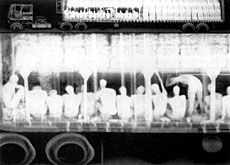Human trafficking fight steps up a gear

European efforts to crack down on human trafficking and protect victims appear to be bearing fruit, according to a leading Swiss law enforcement expert.
Stephan Libiszewski, who heads the country’s fight against the trade in human beings, says improvements to working practices and legislation mean there is now more chance of bringing perpetrators to justice.
His comments follow an Organization for Security and Cooperation in Europe (OSCE) meeting in Vienna on Monday that assessed progress among its 56 member countries.
“I’m not saying the problem is solved but a process is underway in most countries of looking at the problem and following basic procedures: inter-agency cooperation, victim protection and law enforcement,” said Libiszewski, who runs the Swiss Coordination Unit against the Trafficking in Persons and Smuggling of Migrants (SCOTT).
Around 2.5 million people are trafficked across international borders every year, according to estimates by international experts.
Five years ago the Federal Police Office estimated that between 1,500 and 3,000 people in Switzerland were affected by human trafficking for the purpose of sexual exploitation.
Libiszewski told swissinfo that Swiss figure was only a “rough estimate” and a more accurate picture of situation in Switzerland had yet to emerge.
But he said that last year more than 100 trafficking victims sought assistance from the authorities or non-governmental organisations working in the field, though he acknowledged the true number of victims was likely to be higher.
Prosecutions
From 2000-2005 there were 29 successful prosecutions against traffickers in Switzerland – a figure that Libiszewski is not wholly satisfied with.
But the authorities’ ability to counter the trade has been boosted by a couple of recent developments. As of December 1, 2006, all forms and all aspects of human trafficking became punishable under Swiss law and carry a penalty of up to 20 years in jail.
In addition changes to the foreign nationals law – due in force next year – should make it easier for victims to stay in Switzerland and receive social aid, said Libiszewski. The authorities say this should encourage more of them to come forward.
“The general trend is of an increase in convictions and victims getting access to social aid, and Switzerland complies with this trend,” he added.
“I expect the new trafficking law will lead to a further increase in prosecutions and convictions.”
Euro 2008
Another potential challenge looming on the horizon for the SCOTT is the Euro 2008 football championships, which are being held jointly in Switzerland and Austria.
Fears of 40,000 women being forced into prostitution at last year’s World Cup in Germany failed to materialise, but Libiszewski is not taking any chances.
Police will step up checks during the tournament and organisers have pledged SFr100,000 ($80,000) for prevention and awareness campaigns.
“We don’t expect there to be a big increase in the problem in Switzerland but nevertheless there may be isolated cases. Public campaigns contribute to keeping the phenomenon under control,” said Libiszewski.
swissinfo, Adam Beaumont
The Swiss Coordination Unit against the Trafficking in Persons and Smuggling of Migrants (SCOTT) was set up in 2002. Its main aim is to provide better protection for victims and bring the perpetrators to justice.
Trafficking victims in Switzerland are usually women from eastern and southeastern Europe, the Baltic states, Brazil and Thailand who are exploited as prostitutes.
The authorities believe that a large number of human trafficking cases go unreported despite increased efforts to protect witnesses and allow them to stay in the country.
Earlier this year the United Nations Office on Drugs and Crime launched a global initiative to fight the scourge.

In compliance with the JTI standards
More: SWI swissinfo.ch certified by the Journalism Trust Initiative


You can find an overview of ongoing debates with our journalists here . Please join us!
If you want to start a conversation about a topic raised in this article or want to report factual errors, email us at english@swissinfo.ch.